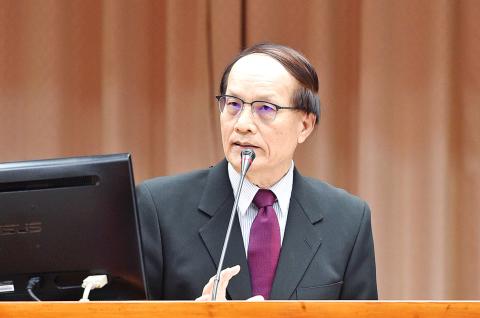The National Palace Museum in Taipei is planning to close for renovations for three years beginning at the end of 2020, Chinese Nationalist Party (KMT) Legislator Ko Chih-en (柯志恩) said yesterday.
Museum Director Chen Chi-nan (陳其南) delivered a report to the Education and Culture Committee at the Legislative Yuan in Taipei and Ko said that documents given to her during a question-and-answer session by museum staff showed that the museum’s library would close on July 1 following an exhibition featuring works by artist Chang Dai-chien (張大千).
The museum’s main building is expected to close at the end of 2020 and be cleared out starting in 2021, with renovation work to take place in 2022 and 2023, she said.

Photo: George Tsorng, Taipei Times
The museum, which houses a wide collection and attracts nearly 5 million visitors each year — the majority of them foreign tourists — has not closed since it was founded, she said.
Ko expressed concern over whether the museum had measures in place for a closure of such magnitude.
The New National Palace Museum Plan documents that the Taipei branch would undergo renovation and expansion work, Chen said, adding, however, that the document did not outline the schedule, as it was not ready when the document was written.
Almost all of the museum’s buildings are to be renovated, he said.
He said museum staff have experience hosting exhibitions and operating amid construction and the consensus was that they would not repeat that experience.
Asked by Ko to clarify whether artifacts at the Taipei branch would be moved to the National Palace Museum Southern Branch in Taibao City (太保), Chiayi County, during the three-year closure, Chen said the museum considers both branches to be part of the museum, so regardless of the duration of renovations — be it three years or five — it would not be a closure, but rather a change of venues.
The museum hopes to attract more foreign visitors to the southern branch, Chen said, adding that while three-quarters of visitors to the Taipei museum are foreigners, the southern branch struggles in this regard.
Separately yesterday, Chiayi County Commissioner Helen Chang (張花冠) said she proposed years ago that the museum’s items be exhibited at the southern branch.
The Chiayi City Government welcomes this move, she said, adding that it would bring more tourists to Chiayi and spur national development.
However, Democratic Progressive Party Taipei mayoral candidate Pasuya Yao (姚文智) yesterday echoed concerns that renovation work at the Taipei branch would affect tourism in the capital.
Yao said the Chiang Kai-shek Memorial Hall should be converted into the museum’s second venue in Taipei.
Then it could be used to exhibit the museum’s most popular artifacts, he said.
Additional reporting by Chou Yan-yu

MAKING WAVES: China’s maritime militia could become a nontraditional threat in war, clogging up shipping lanes to prevent US or Japanese intervention, a report said About 1,900 Chinese ships flying flags of convenience and fishing vessels that participated in China’s military exercises around Taiwan last month and in January have been listed for monitoring, Coast Guard Administration (CGA) Deputy Director-General Hsieh Ching-chin (謝慶欽) said yesterday. Following amendments to the Commercial Port Act (商港法) and the Law of Ships (船舶法) last month, the CGA can designate possible berthing areas or deny ports of call for vessels suspected of loitering around areas where undersea cables can be accessed, Oceans Affairs Council Minister Kuan Bi-ling (管碧玲) said. The list of suspected ships, originally 300, had risen to about 1,900 as

Japan’s strategic alliance with the US would collapse if Tokyo were to turn away from a conflict in Taiwan, Japanese Prime Minister Sanae Takaichi said yesterday, but distanced herself from previous comments that suggested a possible military response in such an event. Takaichi expressed her latest views on a nationally broadcast TV program late on Monday, where an opposition party leader criticized her for igniting tensions with China with the earlier remarks. Ties between Japan and China have sunk to the worst level in years after Takaichi said in November that a hypothetical Chinese attack on Taiwan could bring about a Japanese

Right-wing political scientist Laura Fernandez on Sunday won Costa Rica’s presidential election by a landslide, after promising to crack down on rising violence linked to the cocaine trade. Fernandez’s nearest rival, economist Alvaro Ramos, conceded defeat as results showed the ruling party far exceeding the threshold of 40 percent needed to avoid a runoff. With 94 percent of polling stations counted, the political heir of outgoing Costa Rican President Rodrigo Chaves had captured 48.3 percent of the vote compared with Ramos’ 33.4 percent, the Supreme Electoral Tribunal said. As soon as the first results were announced, members of Fernandez’s Sovereign People’s Party

MORE RESPONSIBILITY: Draftees would be expected to fight alongside professional soldiers, likely requiring the transformation of some training brigades into combat units The armed forces are to start incorporating new conscripts into combined arms brigades this year to enhance combat readiness, the Executive Yuan’s latest policy report said. The new policy would affect Taiwanese men entering the military for their compulsory service, which was extended to one year under reforms by then-president Tsai Ing-wen (蔡英文) in 2022. The conscripts would be trained to operate machine guns, uncrewed aerial vehicles, anti-tank guided missile launchers and Stinger air defense systems, the report said, adding that the basic training would be lengthened to eight weeks. After basic training, conscripts would be sorted into infantry battalions that would take